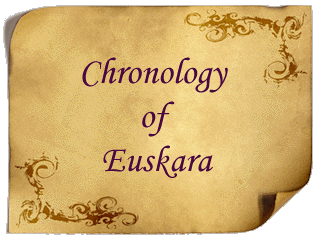|
Chronology |
Historic evolution |
Since the 3rd century B.C.
|
There took place an expansion of the Vascones from Navarre to Catalonia. The Basque language will coexist with Celtiberian, Gaul and Iberian in those lands. |
|
196 B.C.. |
The Romans arrive in the Basque lands. The Greco-Roman geographers describe the Basque tribes that are settled on both sides of the Pyrenees. The tribes speak dialects of the same language: archaic Euskara. |
|
|
There have been found tombstones and inscriptions of the Roman period from the Garonne river (in the middle of France) to Soria (Spain), where personal names and gods are written. |
|
|
Visigoths and Franks invade the territories of the Basque tribes. The Vascones of Navarre will lead the tribes in their fight against the Germans, what will mean the assimilation of the other tribes and the rising of the current Basque people. Development of Common Euskara from the 3rd century to the 6th century A.D.. |
From the 11th century to 1545
|
It is called Medieval Euskara to the few testimonies from the 11th-15th centuries that have been found in the old documents of the different monasteries (glosses of Saint Emilianus) and similar sources until the publication of the first book that was written in Euskara in 1545 (Bernard Etxepare's 'Linguæ Vasconum Primitiæ'). |
|
|
Classical Euskara, since the first novel that was written in Euskara. |
|
1745 - 21st century |
Modern Euskara. Since the Larramendi's 'Trilingual Dictionary' in 1745 to Standard Euskara (developed in 1968). |
